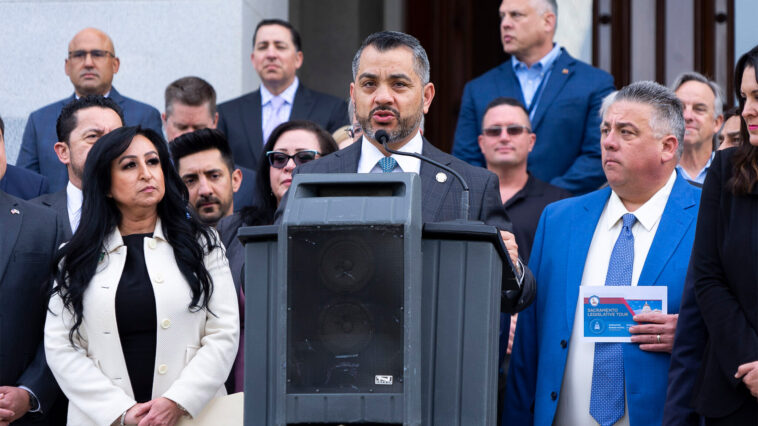A coalition of more than 80 local elected officials and California cities, several of which have cardrooms, announced last Wednesday their opposition to a sports betting initiative sponsored by several tribes and the only one already eligible for the state’s November ballot so far.
The executive director of the California Contract Cities Association, Marcel Rodarte, stated in a press release that if the tribes’ proposed ‘California Sports Wagering Regulation and Unlawful Gambling Enforcement Act’ —which would legalize sports betting only at tribal casinos and licensed racetracks— is passed by voters, it would be detrimental to the state. Top supporters of the ballot initiative include the Pechanga Band of Luiseno Indians in Riverside, the Yocha Dehe Wintun Nation near Sacramento, and the Federated Indians of Graton Rancheria in Sonoma County.
“The California Contract Cities Association overwhelmingly voted to oppose the qualified tribal gaming initiative as it will not benefit our residents or communities,” Rodarte said. “The proposed initiative also exploits the Private Attorneys General Act, opening the floodgates for frivolous lawsuits that will harm city revenues that fund vital city services such as roads, schools, homelessness services and fire protection.”
In early March, two California cardrooms, Hollywood Park Casino and Parkwest Casino Cordova, filed a lawsuit in Los Angeles County Superior Court over the tribes’ ballot initiative. The card rooms allege the measure is unconstitutional and should not be put to voters, given that ballot initiatives can involve only a single subject, while this proposal covers the legalization of sports betting, and also the elimination of California’s ban on Las Vegas-style casinos and the enactment of a private-enforcement provision for criminal violations of gambling laws. The case is still pending.
The cardrooms have unsuccessfully petitioned the California Supreme Court to stop the initiative on an emergency basis, but last month the Supreme Court declined to hear the case at this time. The new suit requires cardrooms to start at the Superior Court level of review.
Critics of the California Sports Wagering Regulation and Unlawful Gambling Enforcement Act say if enacted it would give tribal casinos the ability to put card rooms out of business. The cities opposed to the measure now say it puts more than 32,000 jobs, $1.6 billion in wages, and $5.5 billion in total economic impact at risk.
“During the pandemic, California cities that depend on the revenues generated through legal gaming at cardrooms have seen the devastating impacts cardroom closures have had on municipal budgets and the vital services they fund,” said Leonard Mendoza, mayor of the City of Commerce, in the release. “Hundreds of millions of dollars in local revenues are on the line, money needed to invest in the safety and well-being of our residents.”
A group of tribal casinos, calling themselves the Coalition for Responsible Gaming, put out a statement in response to the cities’ allegations. “Card rooms have one of the worst if not worst records of noncompliance in the United States with gambling laws, including those designed to guard against crimes like money laundering,” the statement said. “That’s why they’ve been fined millions of dollars in recent years for violations like misleading regulators.”
“Our measure simply ensures existing laws preventing illegal gambling are being followed. Card rooms following the law have nothing to worry about. Our measure will not shut down a single card room casino that’s operating legitimately. The only card room casinos at risk of legal enforcement are those that repeatedly violate California gaming laws,” the statement added.
A second initiative is supported by the mayors of San Jose, Colma, Inglewood and Gardena alongside major cardroom operators, and would legalize online and in-person sports betting while also permitting licensed cardrooms to offer additional card and tile games currently limited to tribal casinos.
Another one, backed by DraftKings, FanDuel and other national operators, would legalize online betting in partnership with tribal casinos that meet certain requirements while directing 85% of tax revenues to homelessness programs. It has gained the support of Fresno Mayor Jerry Dyer and the mayors of Sacramento, Oakland and Long Beach. These two last proposals are still gathering signatures.
Tribal casino operators that are not associated with Coalition for Responsible Gaming, under The Californians for Tribal Sovereignty and Safe Gaming campaign, have sponsored television ads painting the online sportsbook operators as out-of-state corporations that will hurt the residents of California.
In January, California Secretary of State Dr. Shirley N. Weber announced that the proponents of the state’s fourth sports betting initiative, backed by the San Manuel Band of Mission Indians and other three tribes, were cleared to begin collecting petition signatures for the November 2022 ballot. This tribal initiative, presented last November by the San Manuel Band, the Rincon Band of Luiseño Indians, the Federated Indians of Graton Rancheria, and Wilton Rancheria, seeks to give tribes exclusive rights for operating both in-person sports betting on tribal lands and online gambling statewide. It also promises funds to solve California’s homeless struggles as it would send 85% of tax revenue per year toward helping people secure housing.
State law allows proponents of a ballot initiative to withdraw their measure any time before the final deadline on June 30.





